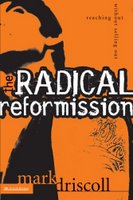
I recently attended
Mars Hill Church in Seattle where Pastor Mark Driscoll has been leading a postmodern congregation of about 3000 for the past 7 years. You can check out their website at www.marshillchurch.org. They have downloadable sermons and vodcasts available there. We attended their morning service in Shoreline (north Seattle) last Sunday. The Shoreline congregation started last January lang. It was a great set up with only a drummer, bassist, and pianist/guitarist leading worship. Simple but really cool. I was inspired by the style of worship. 3-piece band with drums, bass, and keyboard/guitar. Simple but musically really good.
Before we left the service, I bought 2 books at a discounted price. One of them is Mark Driscoll’s book,
“The Radical Reformission: Reaching Out Without Selling Out.” I’ll be posting some quotes from the book shortly after I finish writing this. My favorite quote from chapter 1 is...The way to avoid sin is not to avoid sinners but to stick close to Jesus.
One of the issues that Driscoll has me dwelling on is the importance of knowing our culture so that we can reorganize ourselves to be able to connect to people in ways that clearly communicate the gospel. In the book he makes the point by citing that Billy Graham’s Steps to Peace with God appealed to a generation that understood the gospel in terms of peace because they had gone through the experience of World War II and were searching for a way to find peace. Bill Bright’s Four Spiritual Laws appealed to a generation of students who accepted the absolutes of Newtonian physics. But this wouldn’t fly to a generation that’s been raised on Quantum Physics and the New Sciences. It’s very interesting how Mars Hill Church has contextualized the gospel for the Seattle culture.
I'm including below a list of questions from the book that I think would be helpful for anyone seriously thinking of impacting a culture for the kingdom of God. You will need to spend some time to talk to people about these issues -especially disconnected pre-believers.
This issue has caused me to plan to stop and take the time to do this exercise myself before we start anything in Ottawa. Here are the questions for understanding the cultural context in which we advance the kingdom. I think it is important to begin with specifying which age group or mindset you are trying to reach and how they would answer these questions.
Understanding the Culture We’re In
1. Where do people spend their time and money?
2. What do people do during their free time?
3. What do they fear?
4. What do they dream about?
5. Where do they shop?
6. What cultural experiences do they value?
7. What are the most painful experiences they have had?
8. What music do they listen to?
9. What film and television do they watch?
10. What do they find humorous?
11. In what ways are they self-righteous?
12. What do they read?
13. What is their spirituality?
14. Whom do they trust? Why?
15. What do they think about the gospel?
16. What sins will the gospel first confront and then heal for these people?

















